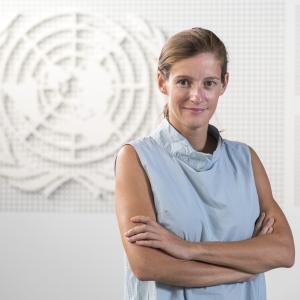On Human Rights Day 2019 international organizations urge for more support for Serbian youth
10 December 2019
Even though the overall unemployment rate has been decreasing recently, high youth unemployment remains the same, despite the National Youth Strategy and other efforts. According to the most recent labour force data available, the youth unemployment rate is twice as high as the general unemployment rate. Especially concerning is the fact that youth aged 18 to 30 are also at the highest risk of poverty.
Belgrade, 10 December 2019 – On Human Rights Day this year, we focus on youth faced with challenges in many parts of the world, including in Serbia. Youth unemployment, poverty risk, and mental health concerns are just some of the problems that Serbian youth face.
Even though the overall unemployment rate has been decreasing recently, high youth unemployment remains the same, despite the National Youth Strategy and other efforts. According to the most recent labour force data available, the youth unemployment rate is twice as high as the general unemployment rate. Especially concerning is the fact that youth aged 18 to 30 are also at the highest risk of poverty.
The situation of marginalised youth groups, such as young Roma is especially difficult, since they are not expressly identified as a vulnerable group in the Law on Public Health. Health care, especially in rural areas, is not equally available to all citizens, including rural youth.
As regards youth mental health, as many as 45% reported being constantly worried about something, and 28% – crying frequently. More than a half of the respondents reported having experienced at least one stressful event in the past two years, with 23% of them experiencing more than one. As many as 12% of the respondents reported feeling completely worthless, while 7% reported having considered ending their lives.
Although an accurate figure cannot be reliably ascertained, the European Statistical Office data show that over 4,000 people leave Serbia each month, and 51,000 – predominantly youth – each year. At an annual level, this corresponds to approximately an entire Serbian municipality.
For youth in Serbia to ensure their rights and greater autonomy, on this Human Rights Day, the UN Country Team in Serbia, the Council of Europe Office in Belgrade, the OSCE Mission to Serbia and the EU Delegation to Serbia affirm that young people should be offered meaningful support, conducive to their self-sustainability and empowerment. We reiterate that it is essential to ensure options for their full participation in society and opportunities to freely express themselves, so that no one speaks on their behalf.
It is crucial that youth, regardless of their background, and especially the most vulnerable groups, be recognised as decision-makers on their own lives, with an equal voice, as their participation in law-, policy- and decision-making at all levels is indispensable.
While overcoming the challenges of transition from childhood to adulthood, from education to economic independence, many young men and women lack support. Youth with disabilities encounter additional barriers to continuing their education or contracting employment in the open labour market.
All young people, regardless of their identity traits, including their ethnic, religious, political, economic and social status, as well as sexual identity should enjoy equal rights, freedoms, and protection.
We want to be clear: young people are not alone and young people matter. Thousands of young people in Serbia and the region are supported, policies and legal frameworks are improved, and youth voice is strengthened and mainstreamed under the programmes of the UN Country Team, Council of Europe Office in Belgrade, OSCE Mission to Serbia and EU Delegation to Serbia. Last year we celebrated the 70th anniversary of the Universal Declaration of Human Rights. Next year marks 70 years of the European Convention on Human Rights, so it is essential that youth continue to be recognised as one of the key groups of human rights holders, since they are among the most vulnerable, as well as among the strongest proponents of the values of diversity and solidarity.






